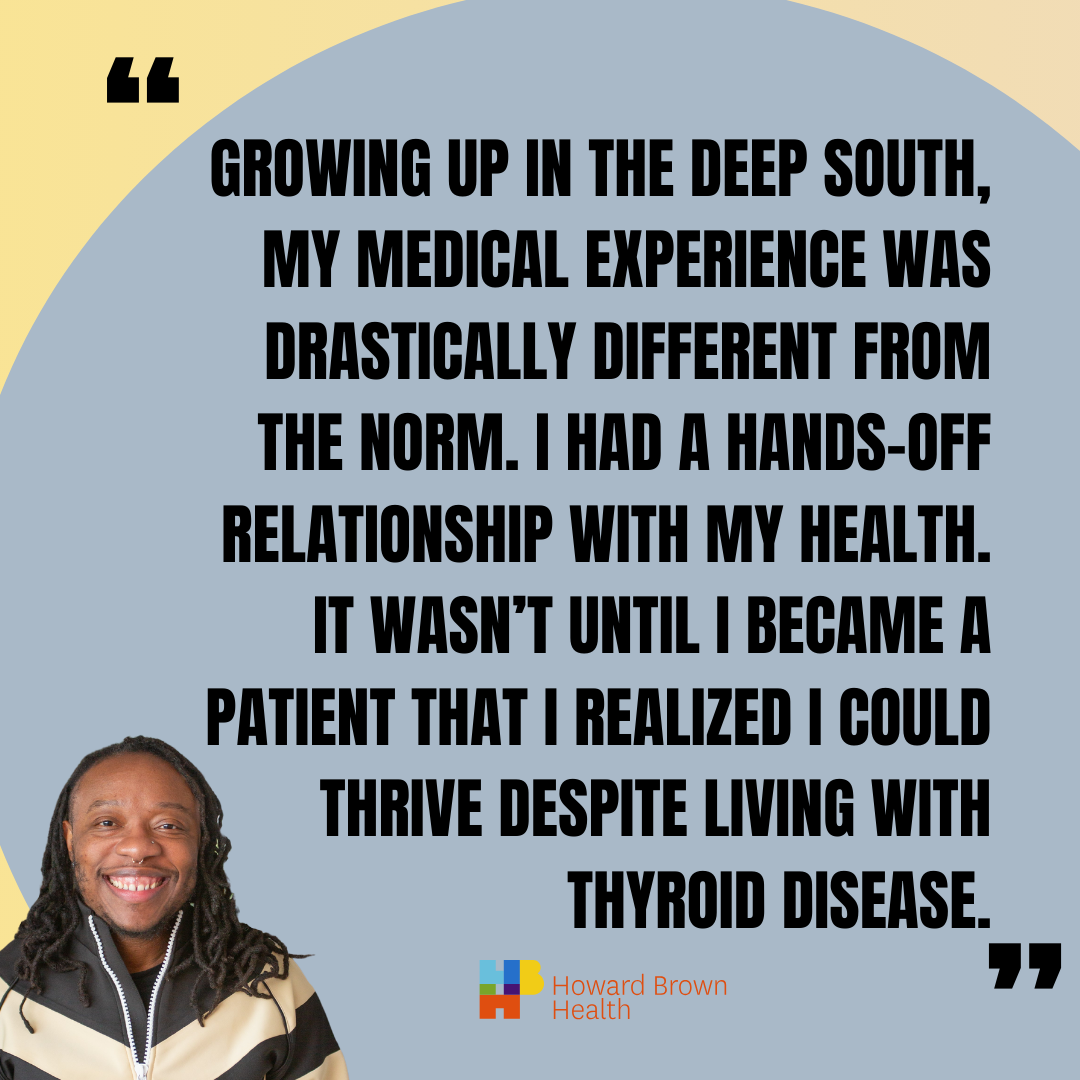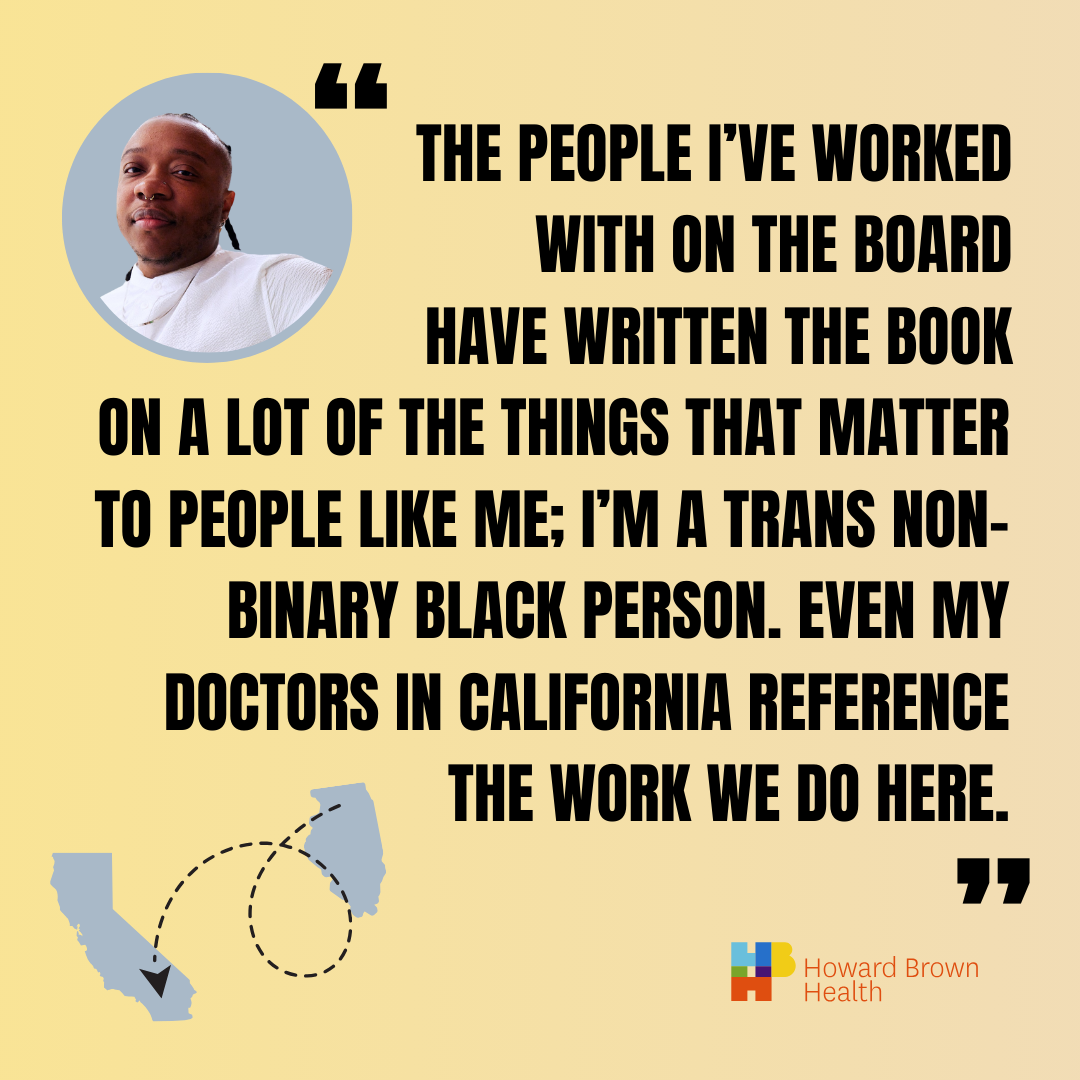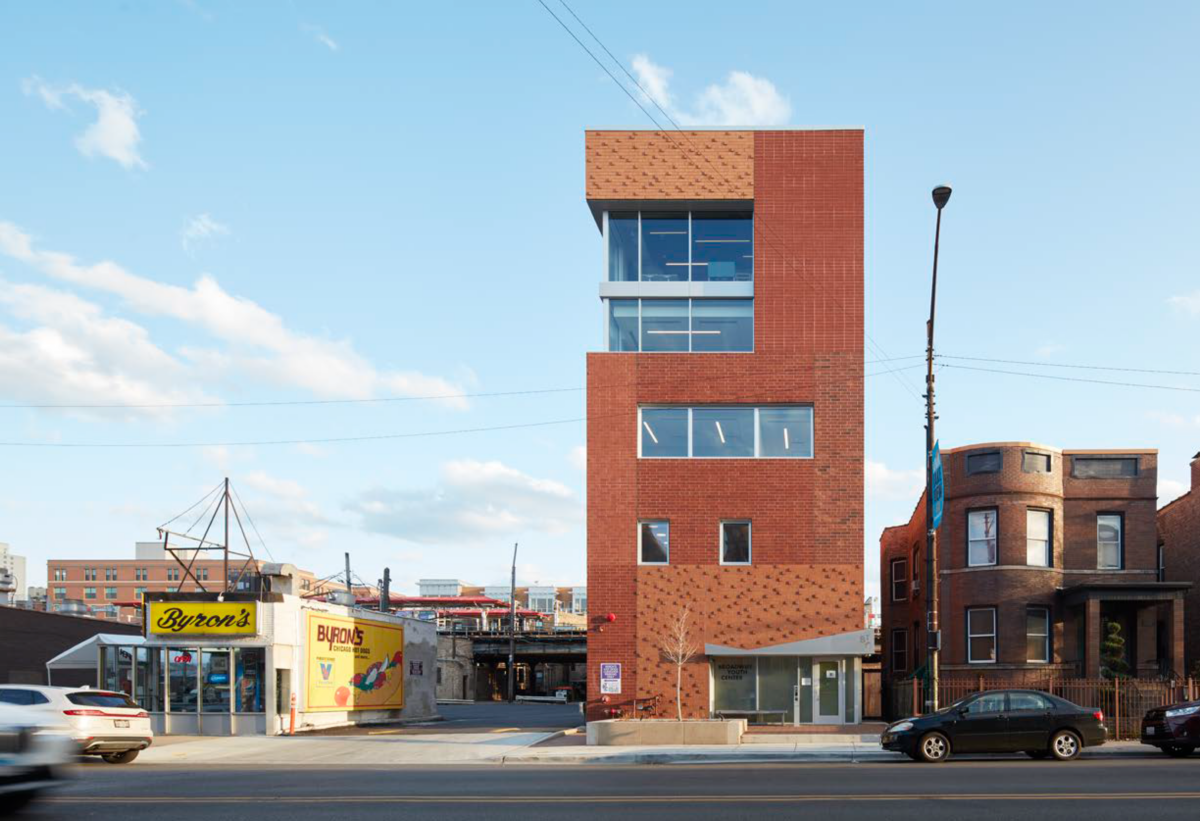The People Behind Our Purpose: B. Pagels-Minor
A conversation with Howard Brown Health Board Member B. Pagels-Minor: entrepreneur, public speaker, and advocate for change.

As the Howard Brown Health Board of Directors begins the search for a new class of board members, we spoke with B. Pagels-Minor about their experience on the board, their commitment to healthcare, and what advice they would give to future board members.
My name is B. Pagels Minor. My pronouns are they, them, and theirs, and I am the founder of Divergent Ventures, which is a venture firm that invests in Middle America. And I also am the co-founder of The Wealth Salons, which is a financial wellness platform that works to help support people building their wealth and keeping their wealth. I’m also a longtime board member of the Howard Brown Health Board. I actually am entering my final six months here on the board. I can’t believe it’s been nine years, but in some ways it feels like I’ve actually grown up with Howard Brown.
I’m from a very small town in Mississippi. The most popular thing it’s known for is being very close to where Elvis was born. The very first time I got on a flight was to go to Chicago for a cousin’s wedding. I remember at 12 being amazed by that. Because, you know, my family was very country, and I mean that in the most affectionate possible way. When I go home, we have fish fries, and I honestly miss them desperately because while I love California and its smoothies, nothing beats a fish fry.
I ended up going to college in Evanston at Northwestern. I was so fortunate that one of my professors, Myron Kwan, a gay Asian American professor, recommend I take an internship with a local non-profit, the Lesbian Community Cancer Project. I applied, got the internship, and I spent the summer working alongside Howard Brown Health employees, asking women about gynecological visits. If you want to get to know people in the city, that’s the best way: asking about results and being okay doing it, helping them however you can.
I was grateful to be a part of the process when the Lesbian Community Cancer Project became Lesbian Community Care Project, and then eventually Women’s Healthcare at Howard Brown Health. We made the decision to merge because we knew we could do more to support women in Chicago by being part of Howard Brown Health. At the time, Howard Brown Health didn’t have a reputation for helping women. We wanted to change that and knowing the scale at which Howard Brown Health operated, we knew we could do it.
Later in 2015, I applied to be on the board of Howard Brown. The cool thing about my work there is that as an intern, I understood what Howard Brown could do. When I was diagnosed with thyroid cancer in my junior year of college, I had insurance, but it wasn’t enough for my treatment. When I needed tests, I went to Howard Brown. It wasn’t just because I worked there.
When I got treatments, I couldn’t be around people due to radioactive iodine being used on me. I was quarantined in my room without access to the outside world. A volunteer from Howard Brown Health dropped off the full collection of Gilmore Girls to distract me from my isolation. So yes, I’m a fan, proud of it. I love it. My mom and dad couldn’t be there, but that volunteer was. She sat outside my door and talked to me. Howard Brown Health made sure I felt okay and seen.
That’s one reason I was committed to Howard Brown. It’s one reason I’m still committed, even though my disease was curable. The worst thing for someone who’s sick is to feel alone and sad. Keeping my spirits uplifted and making sure I knew I mattered was a tremendous factor in my recovery. It supercharged my ability to do other things.

I think back on my relationship with healthcare and my journey, and I keep going back to the start: the deep south. Now that I’ve left, I realize how drastically different healthcare is there from other places in the country. I didn’t necessarily know I wasn’t getting the best healthcare, I didn’t have a negative relationship with it. I just didn’t know. I had thyroid disease for years before I was ever diagnosed. To me, it was just something to get through; I figured I would just treat the illness as it came. I wasn’t in the driver’s seat when it came to my illness.
By the time I got to Howard Brown, I kind of had a laissez-faire relationship with healthcare. I ended up on a softball team with the person who would end up being my provider at Howard Brown Health. They said, “Hey B, let’s run all of your blood tests!” From my test results, we formulated a plan. Between vaccines, supplements, and lifestyle changes, my health was transformed. It was like this game-changing understanding that there’s ways that you can fine-tune your body to be more effective. I was delighted in it.
I love the fact that there were doctors who were just like, “Hey, I see some weird stuff going on here. Let’s ask some basic questions. And since you don’t know, we’re going to teach you so you can have better outcomes.”
Howard Brown Health not only taught me about proactive healthcare but being on the board allowed for a huge amount of personal growth. Watching these community leaders taught me to be professional and had a huge impact on my career.
Howard Brown’s expansion forced us to become better and smarter, humbling ourselves when we didn’t know things. It’s been an honor to get this separate experience in healthcare management by being part of the board.
What people need to understand about the board is that because Howard Brown Health is a federally qualified health center (FQHC), at least 51% of our board members must be patients. Our goal is not just to meet the minimum requirement: we aim for 100% patient representation on the board because patient experience is paramount.
I have a personal connection to Howard Brown as a patient managing a disease. When I moved to California, I remained a patient at Howard Brown. I provided feedback about the blood draw experience, and it improved. Having patients on the board is crucial because they bring firsthand experiences and drive positive changes.
To be on the board, you can be a current patient or former employee. We want individuals who understand the community’s needs, and our board reflects the diversity of our patient population; people who are Black, Asian, Latine, lesbian, trans, gay, gender-expansive, polyamorous, and more sit on our board.
While we value diversity, we also seek specific expertise, such as financial, legal, medical, and people management. The application process is rigorous, involving a thorough review, interviews, and careful selection based on the needs of the board. We take this seriously.
Our board meetings involve committees, each handling different aspects. Committees like governance, executive, and quality assurance contribute significantly to the board’s day-to-day activities. The executive committee, on which I serve, addresses various opportunities and challenges that may arise. The experience is challenging but rewarding, as we collectively strive to fulfill our responsibility to the community, ensuring the best possible care for the 38,000 individuals served by Howard Brown Health each year.
I think that’s one of the biggest things that we try to make sure that people understand: this is a big responsibility and a strong commitment to the organization is the most important part. There’s no pretenses or stuffiness – I was up in there in some shorts with some tank tops, with my sunglasses.
I was like, “Who’s going to say anything? I’m here every day and I pull my weight, right?” That’s all we care about because it’s all about the work.
It goes down to the DNA of every Howard Brown employee. I’ve been around Howard Brown since 2006; almost 18 years. The DNA of Howard Brown employees has not changed much. It’s full of very mission-oriented people. It’s people who could potentially get paid a lot more doing other things but choose to work at Howard Brown because they understand what they’re doing is literally going to change lives.
The people that I’ve worked with at Howard Brown over these past 18 years have literally written the book on most things that matter to people like me. I’m a trans non-binary black person. Even my doctors here in California reference the work we do at Howard Brown. One of the best assets anyone can bring to the board is their own story. It really is just about telling your experiences because that helps us provide better care. It helps us attract donors and community supporters.; Iit drives our mission. We want people who are across all different categories because they bring all their different experiences.

Someone who is community-based, who can talk to folks, tell us what we’re doing wrong and be willing to help us be better? That’s super valuable. Historically people used to always talk about value related to money, but we’ve tried to think about value in new ways. What social capital do you possess? What insight can you offer? Whenever a board has representation across all categories of humans, I’ve found it to be much more effective.
And remember, we have more than one opportunity to get involved. So obviously, there’s the board of directors. We also have the community advisory board. And then we also have the Vernita Gray board as well.
Most importantly, statistics tell us that people from historically under-invested-in communities tend not to apply to things unless they’re a perfect match. I say, “Just apply. Go for it.” Worst case scenario, we respond back to you and say, “Hey, you seem amazing. Would you consider joining this other board?” That’s not a bad proposition. We are a group of volunteers, but we’re also almost all people,who have had challenges in our lives. So, we all know what it feels like to be rejected. We try not to do anything like that in our process. Our goal is to get everyone involved because this is big work, and it’s a lot easier when we can break off pieces and then split it up and all take a little piece.
My time on the board has been marked by huge accomplishments and many things I am proud of. The one thing that I am most proud of is the Broadway Youth Center. I know a lot of my fellow board members agree. For me, it’s even more personal because when I first moved to Chicago, I made a lot of my first queer friends there.
I had never had any queer friends before because I didn’t even realize I was part of that community since I grew up in a place that didn’t see people like me. I didn’t even know my friends at BYC were unhoused. We would just be in the clubs, we would be out eating tacos, whatever. When we finally got close enough, they were like, “Oh, I’ve been unhoused.” Then they’d come crash on my couch. My first time going to BYC was as a senior in college. After seeing what they did and seeing my friends feel whole for the first time, I decided that was a place I wanted to support. Now to see it with its own building, with its own facility, with a space that makes people feel so safe and so cared for, you know, it feels like a real dream come true. That’s exactly the type of exciting stuff that we get to do.
It’s only because we scrimped and saved. We try our best to create these programs and possibilities, despite their not necessarily being very profitable. It’s the challenge of running a nonprofit: you must be nimble and figure out how to do these things, even when they can’t pay for themselves. So, finally giving BYC a permanent home just feels beautiful.
You can have the chance to create change like that too. To make progress for the people you know, for the community around you, and for those that need it most. How will you get involved?

